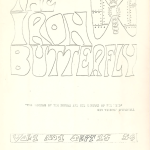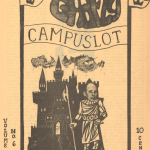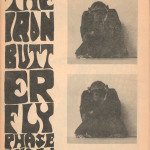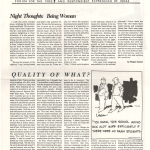Independent papers give students more voices
Students of an increasing number of alternative publications, largely started from scratch, are changing the definition of what it means to be a college journalist and revolutionizing how news at colleges and universities is provided and produced.
By offering an unbound, real-time take on news at Gustavus, these alternative student publications are able to go beyond what the mainstream, traditional publications are able to address.
Sophomore Sam Panzer co-founded one of the leading alternative publications at Gustavus, The Fourth Crown, after reading The Onion.
“I had the idea after a lifetime of reading The Onion really aggressively, and I was thinking that there was certainly a niche that could be filled on campus for a satirical outlook on campus events and topics,” Panzer said.
It’s difficult to make generalizations about the alternative campus media, with some extensive publications posting new stories daily and other smaller outfits publishing once or twice a week. Some, like The Fourth Crown, embrace aspects of new media that traditional journalists can’t offer. Others, like the Bi-fortnightly Anodyne serve primarily as a venue for shorter-form, debate-style writing where students can write about what they’re passionate about and experiment with writing in their own voices as opposed to objective news-speak.
“I don’t like articles that can’t get to the point. I build my content mainly around opposition. If I see something, I argue against it naturally. I hate reading articles where people can’t pick a side,” Founder of the Bi-fortnightly Anodyne Dempsey Schroeder said.
Students are also re-envisioning how to present their content. For instance, The Fourth Crown strictly presents their content through the web.
“We chose the web for ease on our end and accessibility on the viewer’s end,” Panzer said.
Their content tends to be built around different sub sections like campus life, news, sports, and commentary.
“We like to play on more constant components of the Gustavus experience. We don’t have a specific formula for deciding what we want to write about but general constant themes in Gustavus life and a reactionary ear to the ground outlook on anything that’s happening are what we often write about,” Panzer said.
These publications run on tight budgets. Schroeder’s budget for the Anodyne for example, is entirely out of pocket.
“Printing costs are killing me, but I don’t know how to do electronic things, and it’s more romantic to me on paper,” Schroeder said.
While The Fourth Crown operates entirely in the online arena so their only cost is the $2 for their domain name, they’ve decided to try to reach student organization status next year in order to update their site.
“The biggest benefits to our publication right now is that we have virtually no restriction on content as long as we keep it under certain journalistic standards that we’ve set for ourselves, such as protecting intellectual property, recognizing the scope and effects of our reach, and writing with transparency,” Panzer said.
He adds, though, that one of the biggest drawbacks is the restriction that writing articles that appeal to the student body has on their creative control.
“It can be a little bit of a restriction on the total weirdness of the writing we’d like to do,” Panzer said.
Meanwhile, from an administrative perspective, the rise of varying levels of journalistic rigor is emblematic of the increasing number of medium aside from The Gustavian Weekly offering news and opinions on campus happenings and the growing need for attention to student opinion from multiple directions.
“I certainly can’t speak for administration as a whole, and I’ve never read either of these alternative publications, but there’s certainly times when, and this is just social media in general, certain things will come to our attention in the Dean’s office that we have to think about or look into to see if a particular post is one person’s opinion or a larger group’s opinion,” Assistant Dean of Students Megan Ruble said.
While many alternative publications adopt innovative freedom and niche perspectives, they often mirror the aspects of honest and transparent student opinion like that of traditional publications.
“Why an Iron Butterfly? Because The Weekly can’t handle ideas. The Weekly is a dead chronicle because it’s muzzled. Do you want to know what is being produced here on campus? Read the Iron Butterfly, better still, why don’t you write for the Iron Butterfly? If you have an observation you want to share, a thought, or even a funny story, write for the Iron Butterfly.”
“It is our express intent to provide a voice of dissent, to attempt to lampoon the various tendencies toward mediocrity that we find prevalent on the Gustavus campus, to take up the lack left by a college newspaper that is unequal to the task of representing its student body, to provide for general availability some of the more witty and more penetrating observations that are heard round campus.”
“The Iron Butterfly is no longer as you knew it. It may never be recognizable again, because it will change. We have never stated we were perfect in our last attempts. The only absolute is more, perfection never ceases to perfect itself. We go on perfecting ourselves in the pursuit of ideas. Ideas can never be captured, they can only be pursued and expanded.”
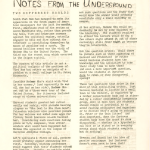 Notes from the Underground 1963
Notes from the Underground 1963
“Despite expectations of doom, we are continuing to publish. In this respect, we are somewhat like the Christian Church. It was prophetically consigned to the garbage can, but continued to rebut its discreditors for 2000 years. But we are both beginning to slow down a bit. Perhaps its the encroachment of age.”
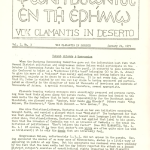 Vox Clamantix in Deserto 1970-1977
Vox Clamantix in Deserto 1970-1977
“The solitary voice of one, crying alone, shouting, proclaiming. Bawling in The Wilderness. In the wild place that is America. In the barren desert that is Gustavus. A small, insignificant voice, becomes agitated and urgent. Magnified by the surrounding silence. Speaking not on God’s behalf, but on behalf of the people. There is no collective voice. There is only the voice of one. Men speak seperately and singly, even when they speak together.”
The Gustavus Globe and World leader Sun Times 1975-1976
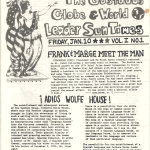 “Why do we write? It seems to me that this question deserves an answer because so many of us do it. We write and hope to have other people, as well as ourselves gain a true understanding of what we are. In writing, we find the perfect medium for expression. The typewriter will not change the subject if you start to talk about what makes you sad and how you actually do feel when you are.”
“Why do we write? It seems to me that this question deserves an answer because so many of us do it. We write and hope to have other people, as well as ourselves gain a true understanding of what we are. In writing, we find the perfect medium for expression. The typewriter will not change the subject if you start to talk about what makes you sad and how you actually do feel when you are.”
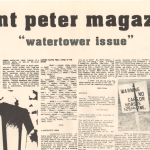 saint peter magazine 1971-1972
saint peter magazine 1971-1972
“Unlike other magazines, there is no obvious readership for the saint peter magazine. It is directed at no one. It is simply paper with ink on it, that is all. Saint peter magazine should not be taken as egotist, personalist, or sunburst. It should be taken for what it is worth, twenty five cents or a poster.”
“What have we learned? Perhaps not textbook journalism. We didn’t learn photo journalism or tip setting problems either; we don’t have the facilities of The Weekly. If you learn by doing, and many of us think you do, then we’ve learned how to use a tool called the Gustie Globe. We’ve learned that a newspaper is an uncomfortable collection of effort, desire, and ideation. The newspaper is the device by which we’ve learned.”
